AWM41 1055 - [Nurses Narratives] Bessie McIntosh Waldon
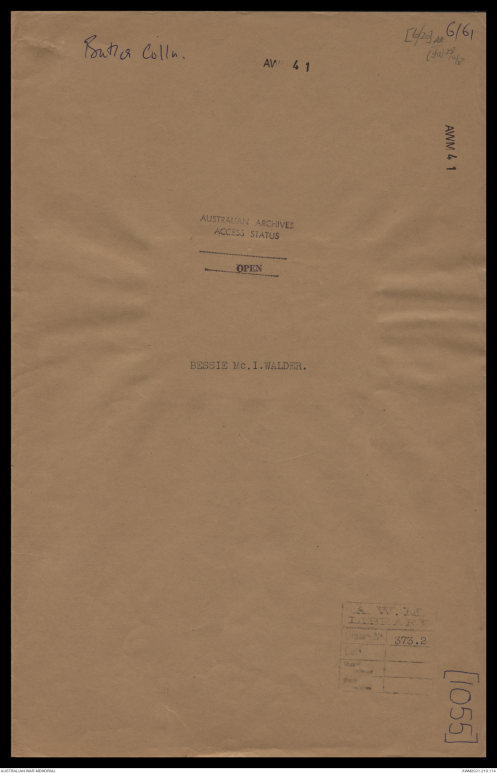
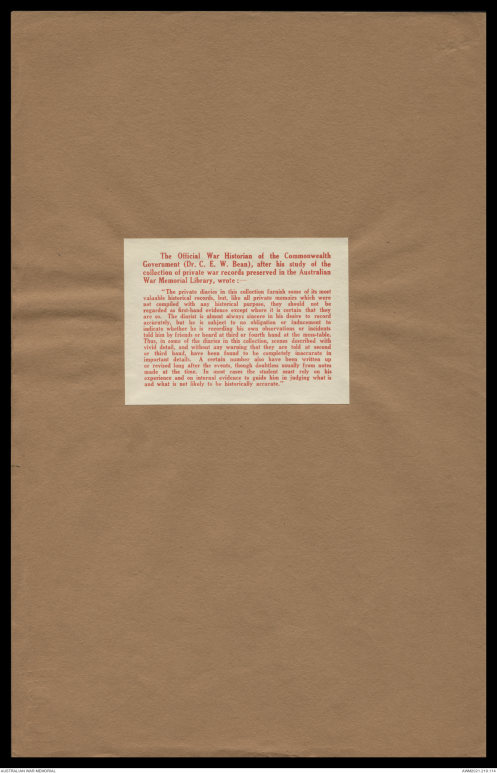
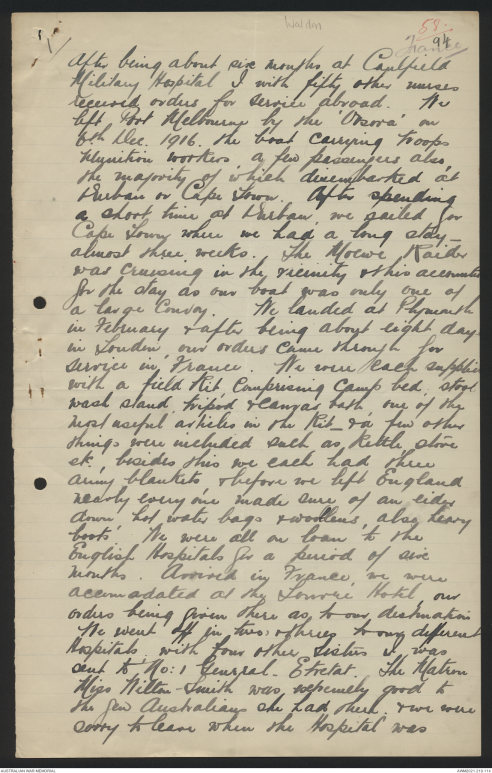
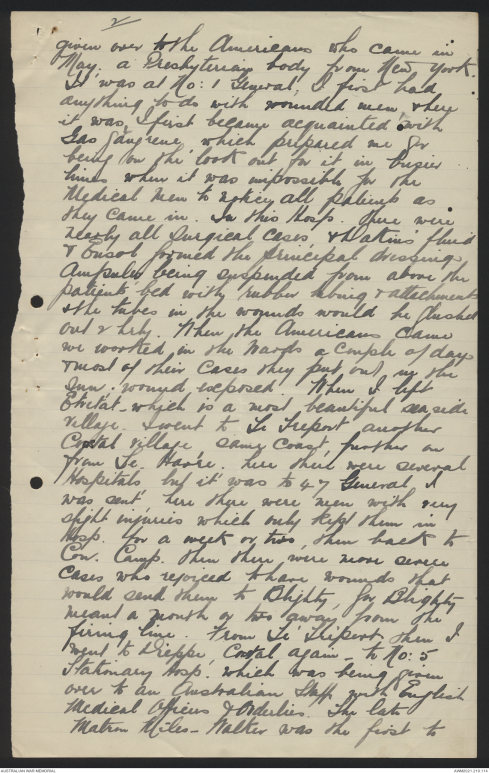
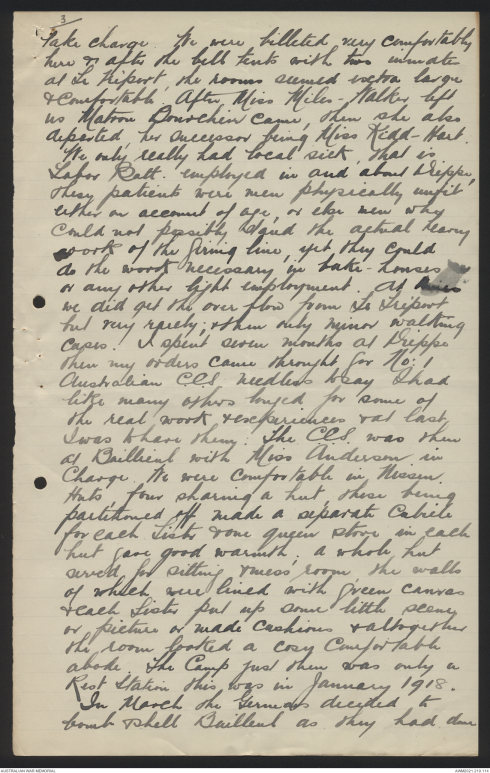
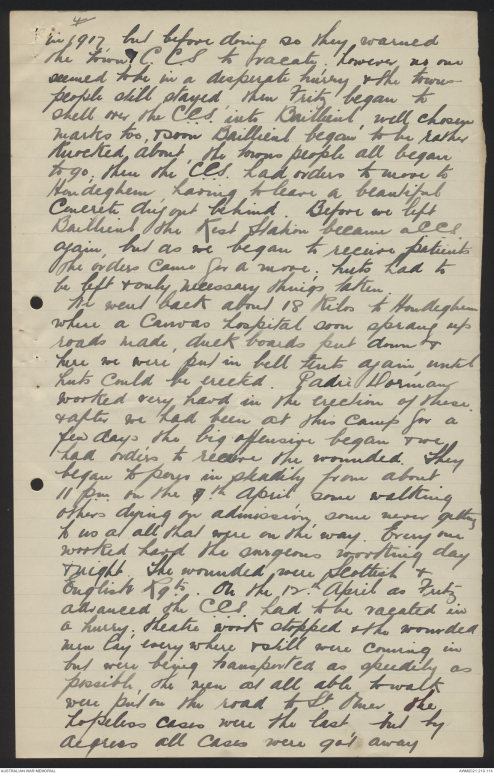
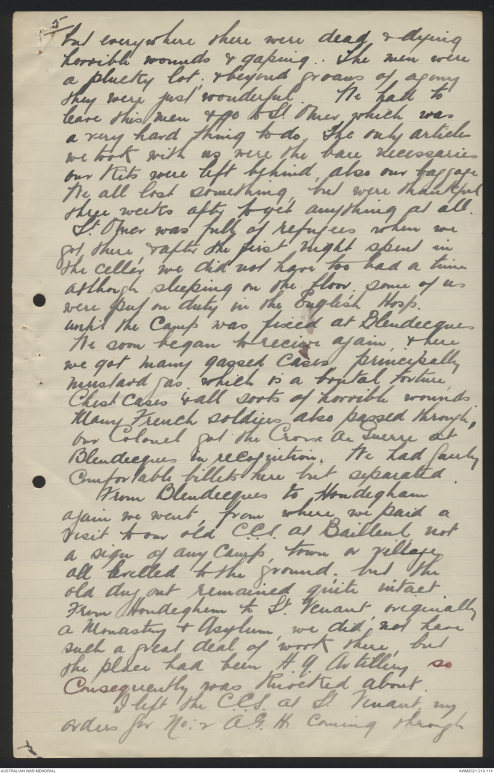
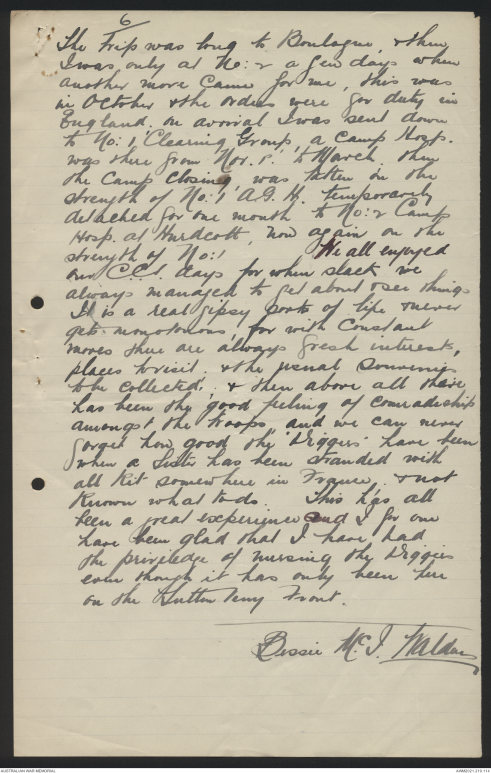
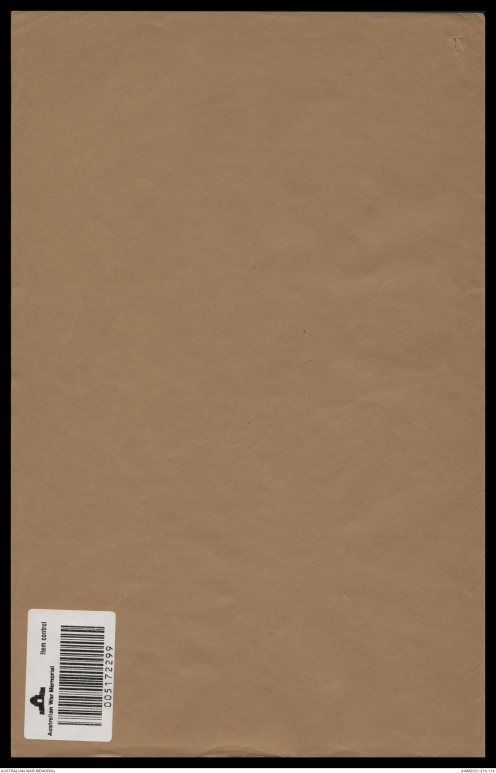
Butler Colln. 6/61
[6/20]
[[?]]
AWM 41
AUSTRALIAN ARCHIVES
ACCESS STATUS
OPEN
BESSIE Mc. I. WALDER.
A.W.M
LIBRARY
ClassnNo 373.2
[1055]
The Official War Historian of the Commonwealth
Government (Dr. C. E. W. Bean), after his study of the
collection of private war records preserved in the Australian
War Memorial Library, wrote :
"The private diaries in this collection furnish some of its most
valuable historical records, but, like all private memoirs which were
not compiled with any historical purpose, they should not be
regarded as first-hand evidence except where it is certain that they
are so. The diarist is almost always sincere in his desire to record
accurately, but he is subject to no obligation or inducement to
indicate whether he is recording his own observations or incidents
told him by friends or heard as third or fourth hand at the mess-table.
Thus, in some of the diaries in this collection, scenes described with
vivid detail and without any warning that they are told at second
or third hand have been found to be completely inaccurate in
important details. A certain number also have been written up
or revised long after the events, though doubtless usually from notes
made at the time. In most cases the student must rely on his
experiences and on internal evidence to guide him in judging what is
and what is not likely to be historically accurate."
Waldon
58/94
France
1
After being about six months at Caulfield
Military Hospital I with fifty other nurses
received orders for service abroad. We
left Port Melbourne by the “Orsova” on
6th Dec. 1916. the boat carrying troops
Munition workers, a few passengers also,
the majority of which disembarked at
Durban or Cape Town. After spending
a short time at Durban, we sailed for
Cape Town where we had a long stay -
almost three weeks. The Moewe Raider
was cruising in the vicinity & this accounted
for the stay as our boat was only one of
a large Convoy. We landed at Plymouth
in February & after being about eight days
in London, our orders came through for
service in France. We were each supplied
with a field kit, comprising camp bed, stool
wash stand, tripod & canvas bath, one of the
most useful articles in the kit - & a few other
things were included such as a kettle, stove
etc., besides this we each had three
army blankets, & before we left England
nearly everyone made sure of an eider
down, hot water bags & woollens, also heavy
boots. We were all on loan to the
English Hospitals for a period of six
months. Arrived in France, we were
accomodated at the Louvre Hotel, our
orders being given there as to our destinations
We went off in twos & threes to our different
Hospitals, with four other sisters. I was
sent to No: 1 General - Etretat. The Matron
Miss Milton-Smith was extremely good to
the few Australians she had there, & we were
sorry to leave when the Hospital was
2
given over to the Americans who came in
May; a Presbyterian body from New York.
It was at No: 1 General, I first had
anything to do with wounded men, there
it was I first became acquainted with
Gas gangrene, which prepared me for
being on the look out for it in busier
times when it was impossible for the
Medical men to notice all patients as
they came in. In this Hosp. there were
nearly all Surgical cases & Dakin's fluid
& Eusol formed the principal dressings,
Ampules being suspended from above the
patients' bed with rubber tubing & attachments
& the tubes in the wounds would be flushed
out 2 hrly. When the Americans came
we worked in the wards a couple of days
& most of their cases they put out in the
sun; wound exposed! When I left
Etretat- which is a most beautiful seaside
village - I went to Le Treport another
coastal village, same coast, further on
from Le Havre. Here there were several
Hospitals but it was to 47 General I
was sent, here there were men with very
slight injuries which only kept them in
Hosp. for a week or two, then back to
Con. Camp. Then there were more severe
cases who rejoiced to have wounds that
would send them to Blighty, for Blighty
meant a month or two away from the
firing line. From Le Treport, then I
went to Dieppe, Coastal again - to No: 5
Stationary Hosp. which was being given
over to an Australian Staff with English
Medical Officers & Orderlies. Then later
Matron Miles-Walker was the first to
3
take charge. We were billeted very comfortably
here & after the bell tents with two inmates
at Le Treport, the rooms seemed extra large
& comfortable. After Miss Miles-Walker left
us Matron Dourchin came, then she also
departed, her successor being Miss Kidd-Hart.
We only really had local sick, that is
Labor Batt. employed in and about Dieppe,
these patients were men physically unfit
either on account of age, or else men who
could not possibly stand the actual heavy
work of the firing line, yet they could
do the work necessary in bake-houses
or any other light employment. At times
we did get the over flow from Le Treport
but very rarely; & then only minor walking
cases. I spent seven months at Dieppe
then my orders came through for No: 1
Australian C.C.S. needless to say I had
like many others longed for some of
the real work & experiences & at last
I was to have them. The C.C.S. was then
at Baillieul with Miss Anderson in
Charge. We were comfortable in Hessian
Huts, four sharing a hut, these being
partitioned off made a separate cubicle
for each Sister & one queen stove in each
hut gave good warmth; a whole hut
served for sitting & mess room, the walls
of which were lined with green canvas
& each Sister put up some little scene
or picture or made cushions & altogether
the room looked a cosy comfortable
abode. The Camp just then was only a
Rest Station this was in January 1918.
In March the Germans decided to
bomb & shell Ballieul as they had done
4
in 1917, but before doing so they warned
the town & C.C.S. to vacate; however no one
seemed to be in a desperate hurry & the towns
people still stayed, then Fritz began to
shell over the C.C.S. into Baillieul, well chosen
marks too, & soon Baillieul began to be rather
knocked about, the towns people all began
to go; then the C.C.S. had orders to move to
Hondeghem,having to leave a beautiful
concrete dugout behind. Before we left
Baillieul, the rest station became a C.C.S.
again, but as we began to receive patients
the orders came for a move; huts had to
be left & only necessary things taken.
We went back about 18 Kilos to Hondeghem
where a canvas hospital soon sprang up
roads made, duck boards put down &
here we were put in bell tents again, until
huts could be erected. Padre Dormay
worked very hard in the erection of these,
& after we had been at this camp for a
few days the big offensive began & we
had orders to receive the wounded. They
began to pour in steadily from about
11 p.m. on the 9th April, some walking
others dying on admission, some never getting
to us at all that were on the way. Every one
worked hard the surgeons working day
& night. The wounded were Scottish &
English Rgts. On the 12th April as Fritz
advanced the C.C.S. had to be vacated in
a hurry; theatre work stopped & the wounded
men lay everywhere & still were coming in
but were being transported as speedily as
possible, the men at all able to walk
were put on the road to St.Omer. The
hopeless cases were the last, but by
degrees all cases were got away
5
but everywhere there were dead & dying
horrible wounds & gaping. The men were
a plucky lot; & beyond groans of agony
they were just wonderful. We had to
leave this men & go to St. Omer which was
a very hard thing to do. The only articles
we took with us were the bare necessaries
our kits were left behind, also our baggage
We all lost something, but were thankful
three weeks after to get anything at all.
St.Omer was full of refugees when we
got there, & after the first night spent in
the cellar we did not have too bad a time
although sleeping on the floor; some of us
were put on duty in the English Hosp.
until the Camp was fixed at Blendecques
We soon began to receive again, & here
we got many gassed cases, principally
mustard gas. which is a brutal torture,
Chest cases & all sorts of horrible wounds.
Many French soldiers also passed through,
our Colonel got the Croix Au Guerre at
Blendecques in recognition. We had fairly
comfortable billets here but separated.
From Blendecques to Hondeghem
again we went, from where we paid a
visit to our old C.C.S. at Baillieul not
a sign of any Camp, town or village
all levelled to the ground; but the
old dugout remained quite intact.
From Hondeghem to St. Venant originally
a Monastery & Asylum, we did not have
such a great deal of work there, but
the place had been H.Q. Artillery so
consequently was knocked about.
I left the C.C.S. at St Venant, my
orders for No: 2 A.G.H. coming through
6
the trip was long to Boulogne, & then
I was only at No: 2 a few days when
another move came for me, this was
in October & the orders were for duty in
England; on arrival I was sent down
to No: 1 Clearing Group, a Camp Hosp.
was there from Nov. 1 to March then
the Camp closing, was taken on the
strength of No: 1 A.G.H. temporarily
detached for the month to No: 2 Camp
Hosp. at Hurdcott, now again on the
strength of No: 1 We all enjoyed
our C.C.S. days for when slack we
always managed to get about & see things
It is a real gipsy sorts of life & never
gets monotonous, for with constant
moves there are always fresh interests,
places to visit. & the usual souvenirs
to be collected; & then above all these
has been the good feeling of comradeship
amongst the troops, and we can never
forget how good the "Diggers" have been
when a Sister has been stranded with
all kit somewhere in France. & not
known what to do. This has all
been a real experience and I for one
have been glad that I have had
the priviledge of nursing the Diggers
even though it has only been here
on the Sutton Veny Front.
Bessie Mc. I. Waldon
 Sam scott
Sam scottThis transcription item is now locked to you for editing. To release the lock either Save your changes or Cancel.
This lock will be automatically released after 60 minutes of inactivity.